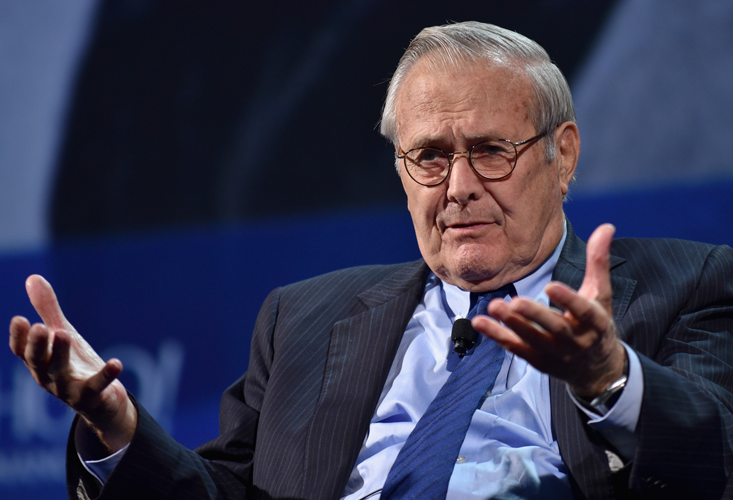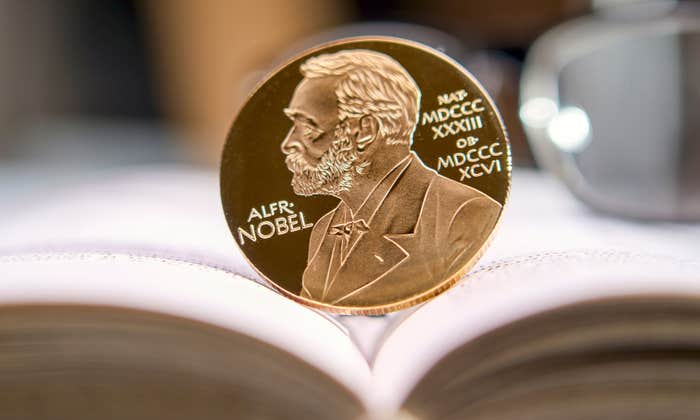Errol Morris feels that Thomas Kuhn saved him from a career he was not suited for—by having him thrown out of Princeton. In 1972, Kuhn was a professor of philosophy and the history of science at Princeton, and author of The Structure of Scientific Revolutions, which gave the world the term “paradigm shift.” As Morris tells the story in his recent book, The Ashtray, Kuhn was antagonized by Morris’ suggestions that Kuhn was a megalomaniac and The Structure of Scientific Revolutions was an assault on truth and progress.
To say the least, Morris, then 24, was already the iconoclast who would go on to make some of the most original documentary films of our time. After launching the career he was suited for with The Gates of Heaven in 1978, a droll affair about pet cemeteries, Morris earned international acclaim with The Thin Blue Line, which led to the reversal of a murder conviction of a prisoner who had been on death row. In 2004, Morris won an Academy Award for The Fog of War, a dissection of former Secretary of Defense Robert McNamara, a major architect of the Vietnam War. His 2017 film, Wormwood, a miniseries on Netflix, centers on the mystery surrounding a scientist who in 1975 worked on a biological warfare program for the Army, and suspiciously fell to his death from a hotel room.

The Ashtray—Morris explains the title in our interview below—is as arresting and idiosyncratic as Morris’ films. In short, it’s a long takedown of Kuhn, who died of cancer in 1996. It’s brilliant and funny but undeniably one-sided. In the Los Angeles Review of Books, Philip Kitcher, a professor of philosophy at Columbia University, who has written extensively on Kuhn, writes that he appreciates The Ashtray for its wit, but that Morris reduces Kuhn to a cartoon figure. Contrary to The Ashtray’s subtitle that Kuhn was “the man who denied reality,” Kitcher explains that in fact Kuhn “tried to square the thought of an independent reality with the thesis of a changing world.” Critic Laura Miller writes that The Ashtray strikes her “as an unlikely source for reaching a better understanding of Kuhn,” but is “a marvelous tool for the better understanding of Errol Morris.”
In our interview, Morris, was by turns mordant, funny, ironic, and outraged. Clearly his view of Kuhn hasn’t cooled over the years. Quite the contrary.
Why does Kuhn still stick in your craw?
One of the feelings I’ve had, probably since I was a little boy, is that there is such a thing as truth, and such a thing as falsity. If there’s anything that gives some measure of nobility to the human enterprise, and there may not be, I would say it’s our search for truth, our search for some connection with the world around us, some understanding of where we are, who we are, what we do, what has happened, and what hasn’t happened. The truth is central to the human enterprise. What stuck in my craw was Kuhn’s underlying belief that there was no such thing as truth, perhaps no such thing as reality, no such thing as progress. It struck me then, and still strikes me now, as a postmodern and pernicious idea.
The Structure of Scientific Revolutions is one of the most influential academic books ever written—not just in the history of science, but in how we talk about truth and knowledge and reality.
Yes, it became overwhelmingly popular, but as a friend of mine once said to me, “So did pet rocks.”
Kuhn’s popular because of his phrase, “the paradigm shift.” The idea, roughly, is that Einstein came along and displaced Newton. He superseded the old view about the universe and now Newtonians couldn’t talk with Einstein’s people because they had two fundamentally different versions of reality.
And this is nonsense because of course scientists talk to each other all the time. We are endlessly changing the nature of science without losing our ability to communicate with each other about it. It’s inconceivable to me that Newton and Einstein, if they had the opportunity to get together and carry on a conversation, would have stared at each other in kind of mute incomprehension. Yeah, they would have had to discuss this and that, they would have argued about various, sundry things. But to say that they could not communicate about science and about the nature of the physical world is nonsense.
Two hundred years ago, 99 percent of human idiocy went unrecorded. Now we have the Internet.
So Kuhn’s idea, correct me if I’m wrong, is that to some degree we’re always trapped inside of our own biases, our own theories. We can’t see beyond the paradigm. And this stays on until a new paradigm comes along and then our view becomes outdated.
Yep. That is such a concise statement. I applaud your concision.
And that idea, to you, is not just wrong, it’s morally wrong?
I would turn it around. It’s morally wrong and it’s also just wrong. There is the idea, “Do we have access to the world around us, or are we just trapped inside of our own heads?” You know, I have this ball of neurological protoplasm inside my skull, cerebrating, and what would make you think that this would give me access to the world around me? But there’s another, powerful intuition: As limited as we are, as confused as we are, we can still search for truth, and we can come to a deeper understanding of ourselves and the world around us.
What was Kuhn like as a professor?
I was an undergraduate at the University of Wisconsin in Madison and it was wonderful. So I thought graduate school at Princeton would be a shining city on a hill. It turned out to be an extended visit with a bear in a cave. Much to my disappointment, I found a strange, ass-kiss world where people were being taught nonsense. A professor who was supremely judgmental and arrogant, and ultimately who espoused beliefs that I found appalling, pernicious.
You’re talking about Kuhn?
Indeed I am. There’s so many things about the world that are disillusioning. That certainly was one of them.
So you wrote an essay for the class and Kuhn wrote 30 pages of comments in response to your essay?
Yes, I believe the comments were longer than the essay itself.
What was the nature of his disagreement with you?
The argument was that I had misunderstood Maxwell’s theories of electromagnetism. Kuhn had a pet peeve. The pet peeve was that people would interpret the past in light of the present. And that is a worry. If you’re writing about 19th-century electricity and magnetism, you want to try and understand those theories on their own terms. But what rubbed me the wrong way is here you have a book—I would say a book of contradictory, sophomoric gobbledygook—where someone is lecturing you that the past is inaccessible. There’s been a paradigm shift! How could we possibly understand what’s going on in the 19th century? We’re now in the middle of the 20th century! The theory itself seemed to be—what’s the word people always use?—“self-defeating.” Self-defeating in the sense that if it’s true, it’s false.
So you went into Kuhn’s office and talked about this?
I tried to talk about it.
What happened?
Basically, you know, I’m not the easiest person to get along with. But I was telling him that I found his ideas to be nonsensical.
I can see that wouldn’t go over very well with him.
No, not so much. He got very cross. And this is at the Institute of Advanced Study, a couple doors down from Einstein’s old office. He got so angry he threw an ashtray.
At you?
I can’t really go into details about the ballistics here.
But it was aimed more or less in your direction?
Yes.
Did he say anything before he threw the ashtray in your direction?
He got angrier and angrier as I was questioning the whole basis for The Structure of Scientific Revolutions. It’s very odd. I’ve never been a member of a cult. I’m not a good cult follower. I’ve never wanted to join one. But I found myself in what I would call a cult. A cult that actually does persist to the current day, of people believing this stuff not for any good reason. Ironically, many academic philosophers attacked Kuhn and The Structure of Scientific Revolutions. Why is that? I’m sure there are lots of institutional reasons, but the philosophers knew that there was something rotten at its core. You know, I have been endlessly fascinated by history, and I often ask myself this question. It’s a fundamental question about history: Can we ever get back to the past?
I sometimes say that language was invented so man could lie more effectively.
Right. Can we ever know what really happened?
Napoleon is credited, when he was exiled on St Helena, with the remark, “History is nothing more than an agreed upon fiction.” A somewhat cynical view. I’ve always believed that it was something much more than that, that maybe we couldn’t ever get back to absolute truth, but we could try. And in some instances, succeed. I have often argued that truth isn’t guaranteed by some kind of style, some kind of documentary style. It’s a pursuit, it’s a quest.
In your 1988 documentary, The Thin Blue Line, about a man convicted of killing a cop in Dallas, you did something provocative and controversial. Every time you would reveal a new piece of evidence, you would reenact the story. You were saying these were different versions of what happened. That’s an interesting way of pursuing the truth.
The idea that you show alternatives to a story does not mean you are saying there is no truth, that truth is subjective, or truth is a matter of opinion. You’re not saying anything of the sort. What you are doing is turning over, in your mind, the various possibilities, to try to arrive at the truth. I found reenactments to be an endlessly valuable tool to understanding the world around me. In The Thin Blue Line, it was taking the various accounts that people had given of this murder, this horrible murder of a police officer, turning them over and over and over again, and by visualizing them, coming to a deeper understanding of whether they were true or false.
Why did you want to go into those subjective experiences as a means of uncovering the deeper truth of what happened?
Because that’s how we come to an understanding of the world. You had all of these witnesses, the stories were contradictory. There were all of these questions that I wanted to examine about memory, about perception and observation. But what I wanted to learn more than anything else was, Did he do it? Is he innocent? Is he guilty? Are these claims true or false? After two and a half years of investigation, it became absolutely clear they were false. They had sentenced to death a man who was innocent. And he came within three days of being electrocuted. That’s a somewhat sobering thought, particularly for him.
Are you saying that what Kuhn proposed about truth is opposed to the hard truth of a convicted man’s innocence?
Absolutely, yes. I joke about it. The Kuhnian priest comes to visit the condemned just before his execution and tells him to suck it up. “You know, it really depends on what paradigm you’re in.”

Another of your films, The Unknown Known, about Donald Rumsfeld and his role in the Iraq war, was an investigation into the historical record. Again, were you looking at levels of complicity here?
That’s unavoidable to the extent that war was unnecessary and motivated by, at best, misunderstandings and mistakes, and, at worst, by lies. I think history involves two parts. There’s the investigation of history and then there’s the investigation of people’s attempts to cover up history, to deny it, to efface it. Often the story of a cover up can be as interesting, if not more interesting, than the truth itself. I might add, if there wasn’t any such thing as truth, why would people be so interested in covering stuff up?
Is your search for historical truth the connecting thread in your work?
I would say both the search for truth and my endless fascination with people’s attempts to avoid the truth. It’s very interesting because people go to books and movies with a whole set of expectations of what this should be, or is going to be. My books and movies often throw people a curve, an unexpected, unanticipated curve. I was once a private detective. Proudly so. And the dream of detective work is, “That guy’s innocent, this guy is guilty, and I was able to show it! Woohoo!” But that’s not the happy outcome of every attempt to investigate the world. Sometimes we end in a muddle, sometimes we can’t prove what we sought to prove. Sometimes we know what’s true and what’s false, but we can’t prove it.
I wrote a book called The Wilderness of Error, taken from an Edgar Allan Poe quote—“in the details I am about to give, some little oasis of fatality amid the wilderness of error”—on the Jeffrey McDonald case [a physician convicted of murdering his wife and two daughters], a case that I’ve been obsessed with for years. I have strong beliefs about it, but can I prove his innocence or his guilt? I cannot. All I can prove is that his trial was an abomination, that it was rigged against him. We can say that there was a miscarriage of justice in the sense that he did not receive a fair trial, but I cannot, alas, prove his guilt or his innocence.
Kuhn’s book became popular, but as a friend of mine said to me, “So did pet rocks.”
You see a line from Kuhn to Karl Rove to Donald Trump. That’s quite an audacious charge, I must say.
I’m not sure it’s a straight line. And it’s not A caused B caused C. But is there a similarity of ideas? Look, lying was not invented in the 20th century. It has a long history. I sometimes say that language was invented so man could lie more effectively.
Kuhn never celebrated lying. He was just saying we could never know the absolute truth.
He was saying not that we couldn’t know the absolute truth but that there was no absolute truth to be known. That’s a big and more ambitious claim. If you strapped me in a chair and asked me, “Do you think you can ever know the absolute truth?” I would say, “Perhaps not.” But I think there is a truth to be known, and furthermore, we should be pursuing it. We shouldn’t be running around telling people, “You’re in paradigm X and I’m in paradigm Y and there’s no communication between us, there’s no fact of the matter.”
So how does that connect to our current political moment?
When we are told there are “alternative facts.” I have another name for alternative facts: Lies. If we imagine a world where anybody can say anything and it’s OK, is Kuhn the progenitor of that idea? Most certainly not. But does his work fit into a kind of postmodern idea where truth is banished from the kingdom and relativism abounds? I want to be careful what I say here. He’s not the source of every single malefaction that we know about in the world. But he’s part of a whole collection of philosophers working on similar ideas around that time, the ’60s, ’70s, and ’80s, and achieving a certain popularity. And, yes, I don’t like them.
There’s debate about whether Kuhn was an absolute relativist. He certainly has defenders who say he doesn’t think everything is up for grabs, it’s just that there are limits to what we can know.
Most certainly he has his defenders, and there are people who virulently disagree with my interpretations of his work. But what bothered me the most about Kuhn was he engaged in a kind of disingenuous argument, a slippery slope. “Yes, I’m a relativist today, I’m not a relativist tomorrow.” You’re saying so many contradictory things that you could be saying anything. You’re being supplied with a kind of pile of mush. I find that even more disturbing than just out-and-out lying, which is certainly a characteristic of our current time. Denial, confusion, misrepresentation—we’re at a point where you don’t even know what to say anymore. That’s the scariest thing about now—the whole rational process by which we decide what is true and false has almost been thrown out the window.
Two hundred years ago, 99.999 percent of human idiocy went unrecorded. Now we have the Internet. We’re in this sea of information and disinformation, a kind of dithyrambic confusion where you don’t know what side is up and what side is down. I think it becomes more important than ever to emphasize the importance of reason, of rationality, of coming to an understanding of what is true and false because there are so many forces arrayed against it. And if I’m one faint voice in the middle of all of this, well, so be it, I’m very happy to be that one faint voice.
Steve Paulson is the executive producer of Wisconsin Public Radio’s nationally syndicated show To the Best of Our Knowledge. He’s the author of Atoms and Eden: Conversations on Religion and Science. You can subscribe to TTBOOK’s podcast here.



























